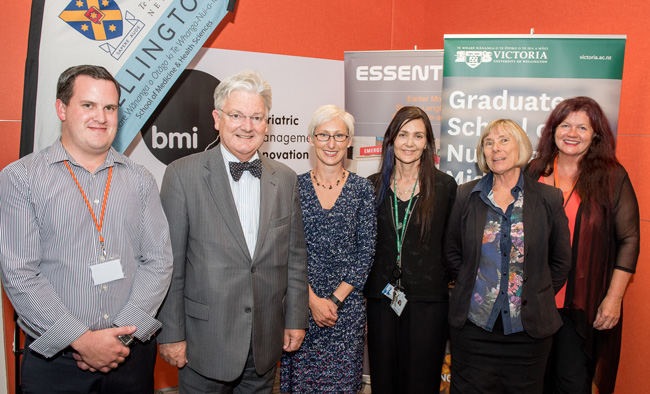
Attending the official launch of a new collaboration to help very large patients are: (from left to right) Essential Helpcare chief executive officer Todd Bishop; Associate Minister of Health Hon Peter Dunne; Victoria University of Wellington Lecturer Dr Caz Hales, University of Otago, Wellington, Dean Professor Sunny Collings, Victoria Graduate School of Nursing, Midwifery & Health Acting Head of School Dr Megan Clark, and Otago Wellington Primary Health Care & General Practice Senior Lecturer Lesley Gray.
Devising ways to better support very large patients in a range of healthcare settings is the focus of a newly launched collaboration between the University of Otago, Wellington and Victoria University of Wellington researchers, and the health care industry.
Senior Lecturer in Primary Health Care and General Practice at Otago's Wellington campus, Lesley Gray is co-founder of a new initiative called Bariatric Management Innovation (BMI), launched last month by the Associate Health Minister Peter Dunne, with a series of research seminars held in Wellington, Christchurch, Dunedin and Auckland.
Ms Gray is working with co-founders Dr Caz Hales, Programme Director at Victoria's Graduate School of Nursing, Midwifery and Health, and Todd Bishop, Chief Executive of Essential HelpCare, a company which provides equipment to hospitals and other healthcare providers.
The aim is to support health care professionals to ensure that very large patients receive safe, appropriate and equitable care.
“When very large patients come into care—be that hospital, a rest home, primary health care settings, or even palliative care—they have basic needs which must be met in a safe and equitable way. This could be anything from a hospital gown that fits, to equipment including beds or chairs that are appropriate,” Ms Gray says.
The BMI initiative will provide independent and industry-supported research in the areas of service provision, the education of healthcare professionals, and will also examine the perspectives of people who use the services.
The BMI team is using a simulation suit, purchased by the Department of Primary Health Care & General Practice at Otago University, Wellington for research and teaching.
“Currently we have two research projects up and running with the suit to better understand whether simulation suits can alter health care professional empathy and perceptions towards larger patients, and if this is a positive effect or not.
The feedback so far is that the suit a very powerful tool—and is showing the health professional participants just how vulnerable their large patients are,” Ms Gray says.
The issue is not going away any time soon, despite the best efforts of public health policy. We have a high obesity rate in New Zealand—about 30 percent of the general adult population, 47 percent of Maori adults and 66 percent of Pasifika adults are classified as obese.
“Our focus with BMI is not trying to change these patients or engage in weight-loss conversations, but to ensure very large patients feel safe, and get the same level of care as other patients.”
Dr Hales and Ms Gray also have a language study underway across New Zealand to ascertain what language health professionals and general population prefer in relation to naming size. It is now some years since a similar study was conducted (in the USA) and the researchers are interested to see if there have been changes and whether we can find terminology that is more acceptable for our patients.
Otago researchers interested in research collaborations with the BMI group can:
Contact Lesley Gray, Ph: 021 029 397292, Email: lesley.gray@otago.ac.nz
See the BMI website: www.bariatricmanagementinnovation.org
